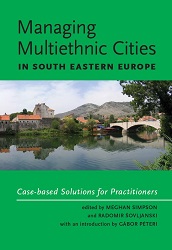The Association of Multiethnic Cities of South Eastern Europe–Philia
The Association of Multiethnic Cities of South Eastern Europe–Philia
Author(s): Jovan Komšić
Subject(s): Politics / Political Sciences, Politics, History, Political history, International relations/trade, Geopolitics
Published by: Centar za regionalizam
Keywords: Association of Multiethnic Cities of South Eastern Europe–Philia; regional relations; international relations; Agreement on Interethnic Tolerance
Summary/Abstract: This chapter introduces the work the Association of Multiethnic Cities of South Eastern Europe–Philia in the decade and a half since the cessation of hostilities in the former Yugoslavia. Growing from its origins as a civil movement and a loose network of activists to an association that now encompasses over 60 communities across Central and South Eastern Europe, Philia works to better trade, diplomacy and relations among its members and the wider region. Facing a particularly daunting task of overcoming mutual hatred and distrust that were prevalent in the results of many public opinion polls after the war, the founders of the Association relied on their prewar contacts to begin to lay the ground for reconciliation and the first few signals of a possible normalization of cross-border relations. Established on the basis of human rights and good governance, Philia has focused on supporting democracy and peace-building at local levels. Its most important requisite for any city’s membership has been the endorsement of the Agreement on Interethnic Tolerance, a document designed to foster and protect European standards of fundamental freedoms and national minority rights, as well as compulsory partnership with a local nongovernmental organization. This bottom-up initiative, driven by its founding members from its general secretariat in Novi Sad, works to reestablish cross-border communication and cooperation through municipal triangles of cooperation. Upholding the principles of free will, autonomy, openness, transparency, respect and consensus, Philia, for instance, does not shy away from promoting the potentially controversial use of minority languages in private and public life, while reaching out to a broad spectrum of interest groups, whether businesses, schools, chambers of commerce, universities or local elected and public officials. Organized around a number of initiatives and public campaigns for civic engagement, Philia members are pragmatic and do not insist that every member take part in every initiative, realizing that these steps are gradual and need time to mature. Through an array of seminars, training courses, capacity development, city diplomacy, research, small grants, campaigns, and alliances with other like-minded pro-European civic organizations, Philia has significantly contributed to interregional dialogue.
Book: Managing Multiethnic Cities in South Eastern Europe - Case-based Solutions for Practitioners
- Page Range: 51-71
- Page Count: 21
- Publication Year: 2010
- Language: English
- Content File-PDF

